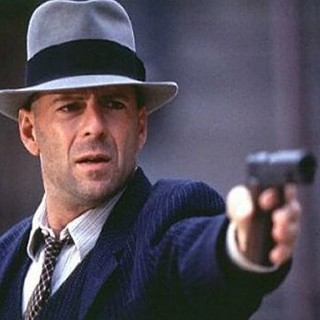Last Man Standing
Legendary and underrated director Walter Hill’s attempt to do a modern day update on Kurosawa’s Yojimbo (and Leone’s Fistful Of Dollars) certainly LOOKS good: The brown, dusty, sepia-colored tones of the cinematography seems to give this story a timeless feel, even if it’s clearly set in the 1920s Prohibition era. As Willis’ “John Smith” comes to this near-deserted ghost town and starts playing the two sides off of each other, despite a great shootout at the beginning and at various points throughout the film, some obvious flaws of Hill’s script (for which Kurosawa is given a story credit) start to rear their ugly head: The motivation of certain characters, for instance, of exactly WHY they choose to help the Willis character, when they very well know it could cost them their lives (the William Sanderson character, for example, only seems to help out because he finds Willis to be “cool”) is made pretty unclear. Also, the development of the roles and the dialogue is weak, but Hill smartly uses certain actors that overcome this and bring their personas into play to carry the film (unlike Leone, who used way too many stilted and dubbed Italian actors to support Eastwood in his version): Bruce Dern contributes a wry and delightful turn as the apathetic sheriff who could give a shit either way about the warring gangs, but helps Willis regardless because he can stand to make a little money off it; Walken, in a rare attempt to play a henchman (as opposed to his usual “Boss” villains), is fierce and intimidating in his (ultra) badass role here; and longtime iconic character actor David Patrick Kelly pretty much walks off with the film as the leader of the Irish mobsters, with his tormented monologues about his true feelings for his enslaved half-breed girlfriend coming off as the most impressive acting in the piece. Sadly, the same cannot be said for the leaders of the Italian mob: Ned Eisenberg and Michael Imperioli fail to make much of an impression, with Eisenberg’s Strozzi being particularly a stereotype, complete with cliché mannerisms. The female leads are also not so great: Karina Lombard and Alexandra Powers as the molls of both Kelly and Eisenberg each get their little deep moments, but both actresses lack the looks and talent to get the viewer invested in them as Willis makes a conscious effort to “save” them. Only Leslie Mann, in the small part of a spacey hooker who talks nonstop during sex, makes any kind of impact for her gender here. Sometimes it seems as if Hill is spending too much time setting up his action setpieces, but when they come on, it’s lots of fun to watch, even though it seems the bad guys ALWAYS get the first shot on Willis (and always miss) before Bruce sends them flying head over heels in a hail of bullets. In the end, it becomes clear that Willis’ mysterious stranger rode into town from who-knows-where looking to make a profit, but ultimately allowed his conscience to take over and dictate his actions, not a bad theme for this kind of story. While Hill doesn’t quite match the Japanese master of cinema with his filmmaking bravura here, he still makes an acceptable update to a fairly timeless story…
7/10
